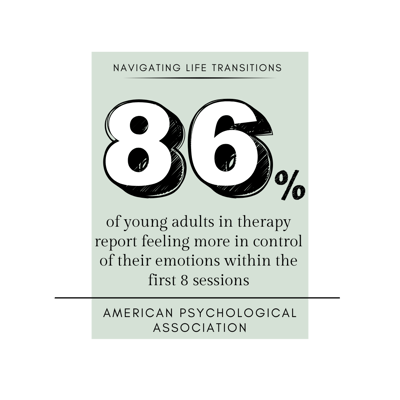The Unofficial Guide to Adulting
How to Handle Anxiety, Imposter Syndrome, and Overwhelming Life Transitions.
.jpg?width=500&height=625&name=Blue%20and%20Yellow%20Modern%20Improve%20Your%20Business%20Image%20with%20a%20Professional%20Website%20Instagram%20Post%20(1).jpg)
Navigating the world as a young adult can feel like a maze of expectations, pressures, and constant change. You're trying to find your footing, but you're hit with anxiety, the stress of major life transitions, and that nagging feeling that everyone else has it all figured out.
This overwhelming noise can make you feel stuck and alone. But you don't have to stay that way.

Here’s the truth: you’re not a mess—you’re human. And finding your footing doesn’t start with having all the answers. It starts with one safe, supportive conversation.
Section 1 – You're Not a Mess—You're Human (and the Data Proves It)
If you’ve been feeling anxious, overwhelmed, or like you’re falling behind, you’re far from alone. The numbers tell the story:
-
60% of young adults feel like they’re “behind in life.”
-
70% say anxiety is a daily part of their life.
-
1 in 3 Gen Z individuals reports struggling with depression.

And here’s the hopeful part: Research shows that many clients begin noticing meaningful changes within the first few sessions of therapy. You don’t have to push through this on your own. There’s a way forward that works for real people just like you.
Feeling hopeful? Discover how we can help find the right match for you
Section 2 – Breaking Down the Noise: Anxiety, Imposter Syndrome & Stress
Navigating major life changes—such as starting college, moving to a new city, launching your career, or discovering who you are—brings excitement and opportunity, but it can also trigger feelings of uncertainty, anxiety, and overwhelm. These experiences are a normal part of growing into adulthood, yet they often come with challenges that may feel difficult to manage alone. If you’re finding it hard to adjust or feeling the emotional impact of a new chapter, you’re not alone. Below are some of the most common challenges young adults encounter as they transition into this important stage of life:
A. The Weight of Overwhelm and Stress
Moving into adulthood often feels like juggling too many balls at once: classes, work, relationships, finances, and the pressure to make it all look effortless. No wonder so many young adults describe feeling stuck, scattered, and exhausted.
What this looks like:
Sarah stays up late studying, skips meals, and tells her friends she’s “fine”—but secretly feels she’s falling behind

B. What Does Anxiety Feel Like?
Anxiety is more than simply feeling stressed or worried. It can affect your mind, body, and daily life in unexpected ways, such as:
-
A racing heart or feeling like you can’t breathe.
-
Overthinking small decisions.
-
Trouble sleeping even when you’re exhausted.
-
Avoiding social situations because they feel overwhelming.
What this looks like:
Amanda scrolls endlessly at night, replaying conversations in her head, worried she’ll never measure up

C. Understanding Imposter Syndrome
Imposter syndrome is the sneaky voice that whispers: “You don’t deserve to be here. Any minute now, they’ll figure you out.”
For ambitious young adults, this can feel especially paralyzing. You land the job, ace the class, or get accepted into a program—but instead of celebrating, you second-guess every achievement.
What this looks like:
Jason just landed his first job, but can’t shake the feeling he slipped through the interview process unnoticed. Each morning he worries today will be the day someone realizes he doesn’t actually know what he’s doing


Try our Figuring It Out Quiz
Not Sure what your dealing with? - Our quiz is a quick, judgment-free tool to help you understand your stress and take the first step toward clarity.

Ready For the First Step?
Finding the right therapist shouldn’t be hard. Tell us what you need, and we’ll do the matching to find you the right fit
Section 3 – Your Story, Your Support: The Trillium Match Process
Starting therapy can feel overwhelming when you’re already juggling so much. Questions like “Where do I even begin?” or “What if I don’t find the right fit?” are common—and completely normal. At Trillium, we believe that support should start with simplicity. That’s why our process is designed to remove the guesswork and make it easier to take that first step toward feeling better.
The hardest part of therapy is often taking the first step. That’s why we’ve created a simple, supportive way to get started: the Match Process.

When you fill out our short form, you’ll share a little about yourself—your goals, challenges, and preferences. From there, we’ll connect you with a therapist who is a strong fit for your unique needs.
This isn’t about being told what’s “wrong” with you. It’s about beginning a safe, supportive connection with someone who understands what you’re going through.

And the impact of starting therapy is encouraging: Research shows that many clients begin noticing meaningful changes within the first few sessions of therapy.1
Reach Out.
Complete our quick intake form—or, if you’re not sure yet, request a free matching consult. Either way, we’ll guide you to the next step
Get Matched.
Our team reviews your needs, preferences, and schedule to connect you with the therapist best suited to support your goals—often within 24–48 hours.
Start You Plan.
Begin sessions with your matched therapist—weekly, biweekly, or as needed. With direct billing and flexible scheduling, you can focus fully on your growth.
Lets us Help you Find the Right Match
FAQs
Therapy works best when the 'fit' is right with your therapist. That’s why we carefully match you with someone whose expertise fits your needs and preferences. Building a strong therapeutic relationship is key to creating a supportive and effective experience.
Before meeting your therapist, you’ll complete a brief intake form. Your first 50‑minute session focuses on what brings you in, your goals, relevant history, and what success would look like. We’ll explain confidentiality and co‑create a plan so you know what comes next. It’s normal to feel nervous—your therapist will guide the pace.
The frequency of sessions depends on your needs and goals. Many people start with weekly or bi-weekly appointments and adjust as they make progress. The total number of sessions is unique to you—your therapist will work with you to find the right approach.
1. one review found that approximately 50% of patients showed measurable improvement by the eighth session (De Geest and Meganck (2018), and another study on trauma-focused therapy found that 58% of clients met improvement criteria prior to completing 12 sessions, with an average of 7.5 sessions (Szafranski et al., 2023)
There isn’t a one-size-fits-all answer — the best approach depends on your unique goals and experiences.
Many young adults find Cognitive Behavioural Therapy (CBT) helpful for managing anxiety, challenging self-doubt, and building confidence during times of change.
Acceptance and Commitment Therapy (ACT) can be especially supportive when you’re facing uncertainty, helping you clarify your values and move forward even when things feel overwhelming.
We may also integrate mindfulness-based strategies to calm racing thoughts, or self-compassion practices to reduce harsh self-criticism.
For those exploring questions of identity, including gender or sexuality, our therapists draw on affirmative and strengths-based approaches to provide a safe, validating space.
Your care plan will always be personalized to fit your needs, your pace, and your comfort level.
Most of our services are covered by extended health benefit plans. Coverage varies with every plan, so please check your specific plan or contact your provider to confirm your benefits.
Most employer benefits cover therapy with a Registered Social Worker (MSW, RSW) or a Registered Psychotherapist (RP). We can direct bill to most major insurers when your plan allows it; otherwise, we email insurance‑ready receipts after your session.
Not sure yet? Let’s talk it through.
If you’d like to ask questions or explore your options first, book a free 20-minute matching consult or give us a call (226-752-8857) . One of our team members will help you find the right therapist and next steps that feel comfortable for you.
%20(1).png?width=200&height=80&name=Trillium%20Counselling%20Logo%20(999%20x%20398%20px)%20(1).png)

















